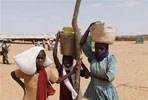
Reuters reported this week that the worsening security situation in Darfur is forcing the United Nations to further cut vital programming in Sudan’s troubled western region. This announcement from the U.N. comes on the heels of the kidnapping of two German aid workers from the South Darfur capital of Nyala and the deaths of three Rwandan peacekeepers which resulted from an ambush in Nertiti, a town in the volatile area of Jebel Marra.
Security has indeed been worsening in recent months due to increased fighting between Sudanese Armed Forces and the Justice and Equality Movement (which recently backed out of the peace talks in Doha), as well as inter-communal violence in West Darfur. In both cases, the fighting has limited UNAMID’s (the U.N.-A.U. hybrid peacekeeping mission) ability to properly assess the humanitarian situation in these areas, access the most vulnerable populations, and provide the security necessary for aid agencies to distribute goods and services to those affected. “The reduction of access due to insecurity has already resulted in some cases of either a complete suspension or a serious reduction of activities and delivery of assistance by humanitarian agencies,” stated the U.N. yesterday. The U.N. World Food Programme, for example, said that more than 400,000 Darfuris might not receive food aid this month as a result of the insecurity.
This new reduction in services is certainly not the first blow to aid beneficiaries in Darfur. Following the expulsion of 16 international and Sudanese aid agencies in March 2009, “non-essential” services such as those assisting children and survivors of gender-based violence, were reduced significantly, as was the depth and reach of humanitarian aid more generally. Many of the expelled organizations had offices in deep field locations (those outside major towns) where very few other agencies were present. Since the expulsion, the remaining agencies have tried to replace some of the services that these expelled organizations offered, but both the security situation and the lack of capacity have in large part prevented them from doing so, leaving those most in need without assistance.
These most recent attacks indicate that aid workers and peacekeepers are now ulnerable to kidnappings in the major towns and areas where they live. While car-jackings and compound robberies have certainly been the norm in Darfur’s state capitals in recent years, kidnappings have generally occurred when humanitarians are on the road, suggesting that the crimes are more opportunistic. Now, however, it appears that humanitarians are being targeted by kidnappers in towns like Nyala, suggesting that the safe space for humanitarians to work in Darfur is shrinking by the minute. This mostly certainly means negative consequences for the people of the region.
The U.N. mission has called on the Sudanese government to arrest and prosecute those responsible for harming humanitarians in Darfur, so that it might serve as a deterrent to other potential criminals and allow aid agencies to function as intended. However, given the government’s track record of blatant lack of concern for the needs of the average Darfuri, it seems unlikely that the government would go out of its way to ensure that they receive assistance. What this means for humanitarian operations in the region remains to be seen.
Photo: Children in an IDP camp in Darfur (AP)

